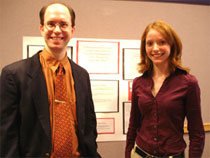 Rosalind Newsholme
Rosalind Newsholme
Communicated Messages of the China National Tourism Administration: China Modern or China 'the Other'?
Economic and social relations between the United States and China are growing rapidly. In response to this, institutions within both nations create media content aimed to contribute to the expansion of these relations. The China National Tourism Administration (CNTA) is controlled and funded by the Chinese government. By implementing several types of media, the Administration attempts to convince American tourists to visit China. The CNTA is linked to the Chinese Tourism Association (CTA), which distributes its media content through websites and a printed publication, China Tourism. It was my goal to analyze media messages created by the CNTA through its web pages and China Tourism. I predicted that the CNTA would encourage Western tourist audiences to view China as a nation that is dramatically different from the West and the United States, particularly. Consequently, I thought China would be framed as a place worth visiting instead of other countries. I expected that China would be framed as Edward Said's 'the Other,' and depicted as a place that is foreign, traditional and implicitly inferior. But why might China and the CNTA 'Other' its own nation? By encouraging larger numbers of American tourists to visit China, economic and social relations could expand. I found that the media messages delivered by the CNTA, through the CTA, not only 'Other' China to make the country attractive to Western audiences, but also 'Westernize' China. This is done in an attempt to make it seem traditional and modern simultaneously. Thus, contradictory messages are available for consumption by American audiences: China the foreign, traditional nation that has resisted modern life and China the modern nation that is no longer traditional and instead, is capable of advancing economic and social relations with the United States.
